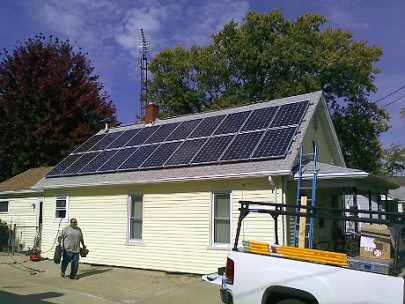
Critics of the bills say they will damage Michigan’s solar industry.
By Ray Wilbur
Capital News Service
LANSING – Environmental and renewable energy advocates are concerned that proposed legislation would discourage investment in clean energy.
Sen. Mike Nofs, R-Battle Creek, introduced bills in 2015 to meet the state’s energy requirements as coal plants continue to shut down as utilities use cleaner fuel sources over the next three years.
The bills have passed the Senate and await action by the House, where Nofs said he hopes to see them pass before the end of the year..
But some supporters of alternative energy say that new language added to the bill would create a utilities charge for state residents who use solar power to generate their electricity. The bill does not specify the amount, but gives the Public Service Commission the power to decide how much it would be.
The new charge would include the cost to the utilities of getting residents’ solar power to the grid, Nofs said. Residents using solar don’t pay that now.
Others argue that the provision would discourage customers from investing in private solar power and would mean unfair rates for ratepayers, said John Sarver, a board of directors member of the Great Lakes Renewable Energy Association.
“It’s just an obvious way to help the utilities,” Sarver said. “Solar customers provide benefits, and by only allowing the commission to impose charges, the bill neglects those benefits.”
The benefits include providing clean electricity for the state’s power grid during peak use periods instead of having utilities rely on more expensive power from what are called peak power plants, said Mark Hagerty, president of Michigan Solar Solutions in Commerce Township.
Now solar customers get credits under state law when they provide their excess electricity to the grid during peak use.That saves the utilities money, Hagerty said. It also allows solar customers to sell their electricity to the market without paying for grid charges.
Nof’s bill would negate those credits by creating the additional charges, although those have not been defined yet, Hagerty said.
“The bill could discourage some people from investing in solar,” Nofs said. “But this is to make it so they are paying their fair share.”
Renewable energy advocates argue that this issue should not be legislated now because of the low number of Michigan solar customers. Under current law, utilities have to accept solar users only up to 1 percent of the state’s nearly 10 million residents. About 2,100 residents use solar now.
It’s capped so to not disrupt the utilities’ share of the electric grid.
“If we get to that cap and we need regulatory structure, then we can discuss it at that point,” said Sam Gomberg, an energy analyst with the Union of Concerned Scientists.
“Right now it would lead to a grid charge that will stymie the market for these resources, and that doesn’t make sense.”
The regulation of solar energy should be left up to the Public Service Commission, Gomberg said, which can weigh the benefits and costs of residential solar power.
“The commission is meant to represent the customer,” Gomberg said. “It was never designed to represent and help the utilities.”
The commission will weigh the benefits and costs of a resident’s solar power to the grid, Nofs said, and make a decision on the charge.
Utility companies in the state have spent millions of dollars in the past year to influence lawmakers, and advocates see the controversial provision e as clear evidence of that money’s power.
DTE reported $361,242 in total lobbying expenditures in 201,5 and Consumers Energy reported $311,117, according to the Secretary of State’s data. In the last six months, DTE reported buying meals for Nofs and House Energy Chair Aric Nesbitt, R-Lawton.
